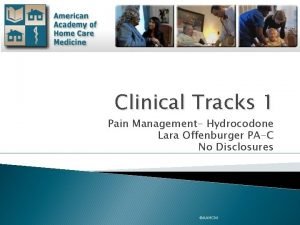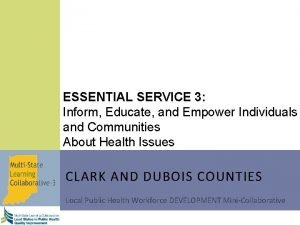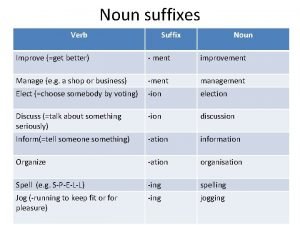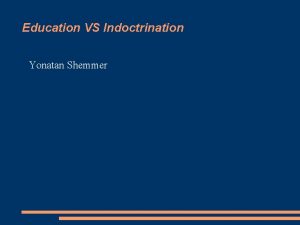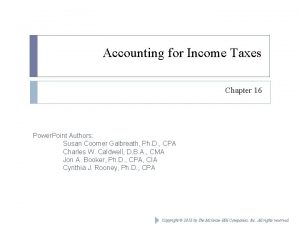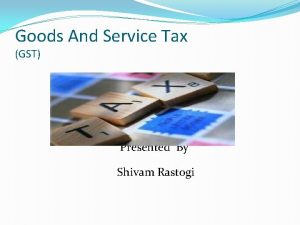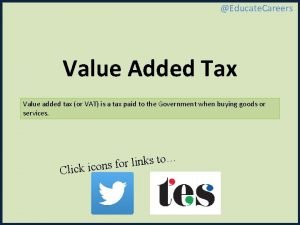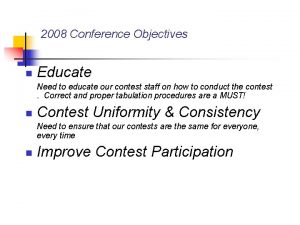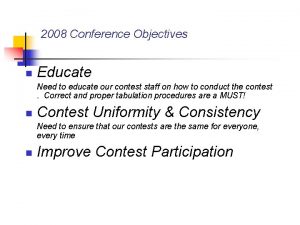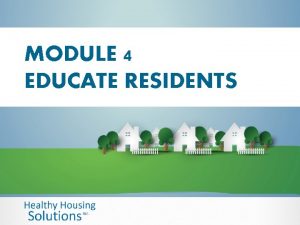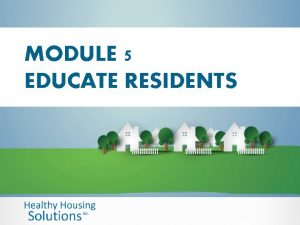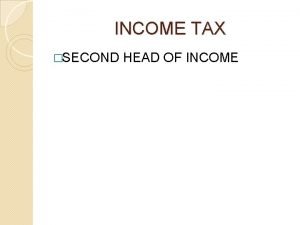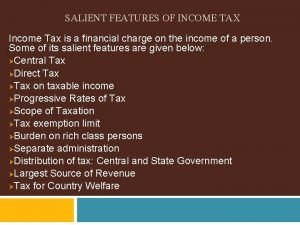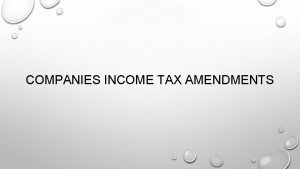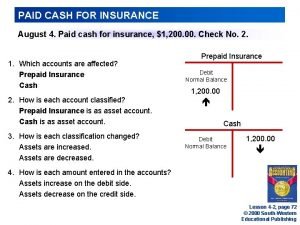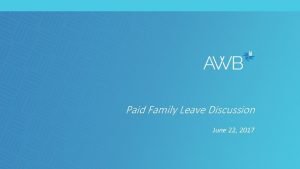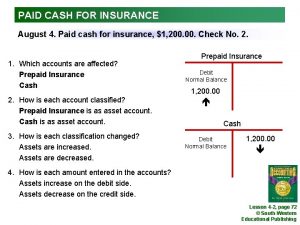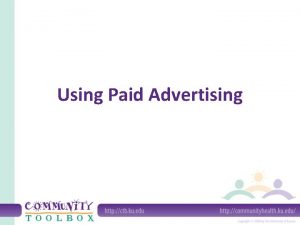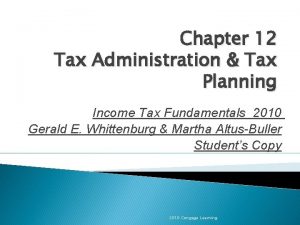Educate Careers Income Tax Income tax is paid























- Slides: 23

@Educate. Careers Income Tax Income tax is paid by people when they earn money. Here you will be presented with 10 questions related to when people pay tax and what percentage they will pay. o… t s k n i l r o f Click icons

@Educate. Careers Question 1 The Government make changes to the nations income tax each year. What date do the changes come into effect? A January 1 st B April 6 th C December 1 st D December 31 st

@Educate. Careers Question 1 The Government make changes to the nations income tax each year. What date do the changes come into effect? B April 6 th Each year the Government introduce changes they come into effect on April 6 th, this is the start of the financial year. The changes are announced in March.

@Educate. Careers Question 2 Everyone gets a ‘personal allowance’. This is an amount of money a person can earn and they don’t pay any income tax on it. How much is it for the 2017/18 year? A £ 11, 000 B £ 11, 500 C £ 15, 000 D £ 25, 000

@Educate. Careers Question 2 Everyone gets a ‘personal allowance’. This is an amount of money a person can earn and they don’t pay any income tax on it. How much is it for the 2017/18 year? B £ 11, 500 In 2016/17 the amount was £ 11, 000 and it has been raised to £ 11, 500. This means a person who earns this amount (or less) doesn’t pay any income tax. This applies to everyone, even millionaires will get £ 11, 500 income tax free.

@Educate. Careers Question 3 When someone earns more that £ 11, 500 they must pay basic income tax on the amount above £ 11, 500. What percentage tax do they pay? A 5% B 20% C 40% D 60%

@Educate. Careers Question 3 When someone earns more that £ 11, 500 they must pay basic income tax on the amount above £ 11, 500. What percentage tax do they pay? B 20% This means if a person was to earn £ 12, 000 in a year they would have £ 11, 500 tax free and would pay 20% income tax on the remaining £ 500. They would pay a total of £ 100 income tax.

@Educate. Careers Question 4 The basic income tax only applies to a salary of a certain amount of money. How much can a person earn before they have to pay a higher rate of income tax? A £ 15, 000 B £ 25, 500 C £ 45, 000 D £ 65, 000

@Educate. Careers Question 4 The basic income tax only applies to a salary of a certain amount of money. How much can a person earn before they have to pay a higher rate of income tax? C £ 45, 000 If a person earns up to £ 45, 000 they will pay no income tax on the first £ 11, 500. They will then pay 20% on everything between £ 11, 500 and £ 45, 000. They will pay 20% on £ 33, 500, a total of £ 6, 700 will be paid over the year.

@Educate. Careers Question 5 If a person earns more than £ 45, 000 a year they must pay a higher rate of income tax on the money above this figure. What percentage income tax do they pay? A 25% B 35% C 40% D 60%

@Educate. Careers Question 5 If a person earns more than £ 45, 000 a year they must pay a higher rate of income tax on the money above this figure. What percentage income tax do they pay? C 40% They will still get a personal allowance of £ 11, 500 and will still pay 20% for the money they earn up to £ 45, 000. But they will then pay 40% income tax on everything over £ 45, 000.

@Educate. Careers Question 6 The higher income tax applies once a person earns between £ 45, 000 and how much? A £ 55, 000 B £ 65, 500 C £ 95, 500 D £ 150, 000

@Educate. Careers Question 6 The higher income tax applies once a person earns between £ 45, 000 and how much? D £ 150, 000 This means they will pay the following tax: • 0% on the first £ 11, 500 • 20% between £ 11, 501 and £ 45, 000 • 40% between £ 45, 001 and £ 150, 000

@Educate. Careers Question 7 If a person earns over £ 150, 000 they pay an additional rate of tax on everything over that figure. What percentage do they pay? A 45% B 55% C 65% D 75%

@Educate. Careers Question 7 If a person earns over £ 150, 000 they pay an additional rate of tax on everything over that figure. What percentage do they pay? A 45% This means they will pay the following tax: • 0% on the first £ 11, 500 • 20% between £ 11, 501 and £ 45, 000 • 40% between £ 45, 001 and £ 150, 000 • 45% on anything over £ 150, 000

@Educate. Careers Question 8 The Government have worked out how many people they believe will benefit from the changes for 2017/18. How many people should be financially better off? A 1. 5 million B 10. 8 million C 15. 3 million D 28. 9 million

@Educate. Careers Question 8 The Government have worked out how many people they believe will benefit from the changes for 2017/18. How many people should be financially better off? D 28. 9 million This is because the government have raised the amount of money people can earn before they have to pay the next rate of tax. This means that nearly half the country should financially benefit.

@Educate. Careers Question 9 The Government have worked out how many people they believe will lose out from the changes for 2017/18. How many people should be financially worse off? A 1. 6 million B 6. 8 million C 11. 3 million D 18. 4 million

@Educate. Careers Question 9 The Government have worked out how many people they believe will lose out from the changes for 2017/18. How many people should be financially worse off? A 1. 6 million Some changes to those that earn over £ 100, 000 means they may pay more in tax. On average they will be around £ 23 worse off per year.

@Educate. Careers Question 10 The personal allowance was £ 11, 000 in 2016/17 and will be £ 11, 500 in 2017/18. How many people should benefit? A 13, 000 B £ 105, 000 C 424, 000 D 985, 000

@Educate. Careers Question 10 The personal allowance was £ 11, 000 in 2016/17 and will be £ 11, 500 in 2017/18. How many people should benefit? C 424, 000 This is because around 424, 000 people earn somewhere between £ 11, 000 and £ 11, 500 per year. Last year they would have paid 20% income tax on anything over £ 11, 00 and now they don’t need to pay any income tax.

@Educate. Careers Income tax rates 2017/18 • • Personal allowance of 0% on anything up to £ 11, 500 Basic rate of 20% between £ 11, 501 and £ 45, 000 Higher rate of 40% between £ 45, 001 and £ 150, 000 Additional rate of 45% over £ 150, 000

@Educate. Careers For more information: • https: //www. gov. uk/government/publications/income-tax-personal-allowance-and-basic-rate-limit-for-2017 -to-2018/income-taxpersonal-allowance-and-basic-rate-limit-for-2017 -to-2018 o… t s k n i l r o f Click icons
 Impact of ict in education
Impact of ict in education Kilcolgan educate together
Kilcolgan educate together Explore engage empower
Explore engage empower Belmayne educate together
Belmayne educate together Suffix educate
Suffix educate It takes the whole village to educate a child
It takes the whole village to educate a child Educate fortox
Educate fortox Essential services
Essential services Educate adj
Educate adj Educate your desires
Educate your desires Educate women
Educate women Damaged 3. hali
Damaged 3. hali Aws educate vocareum
Aws educate vocareum What is the suffix of improve
What is the suffix of improve It takes a whole village to educate a child
It takes a whole village to educate a child Indoctrinate vs educate
Indoctrinate vs educate Deferred tax calculation balance sheet approach
Deferred tax calculation balance sheet approach Heading of statement of comprehensive income
Heading of statement of comprehensive income Loss contingency journal entry
Loss contingency journal entry Value added method gdp
Value added method gdp Hasil bukan pertukaran
Hasil bukan pertukaran James wilson income tax
James wilson income tax Easyoffice software
Easyoffice software Movable assets
Movable assets






